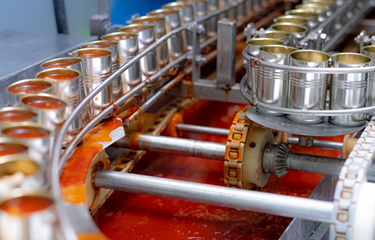US announces preliminary tariffs on foreign tin used in canning seafood

The U.S. Department of Commerce has determined that tariffs should be placed on tin products used in seafood canning being imported from China, Canada, and Germany. The government declined to place tariffs on tin being imported by companies in South Korea, the Netherlands, Taiwan, Turkey, and the United Kingdom.
“These findings demonstrate that Commerce took a careful and nuanced approach based on the particular circumstances presented by each company and the governing provisions of U.S. law,” the U.S. Department of Commerce said in its announcement. “These preliminary determinations underscore Commerce’s commitment to remedying unfair trade practices, to which U.S. workers, companies, and farmers are entitled under U.S. law.”
The U.S. Department of Commerce has determined a dumping rate of 123 percent for Chinese tin imports, 5 percent for Canadian imports, and 7 percent for German imports. The decisions are not final, and the department will now conduct audits to verify the information it based its determinations on. A final decision on the Chinese dumping rate will be made 31 October, while decisions on other countries will be made in January.
The Can Manufacturers Institute (CMI) praised the government’s decision to not impose new duties on multiple countries, while recommending the department drop the proposed duties on Canada and Germany.
“CMI applauds the Commerce Department’s decision to not impose duties on tin mill products imported from the Netherlands, the United Kingdom, Turkey, Taiwan and South Korea,” CMI President Robert Budway said. “We are hopeful the final Commerce determination will eliminate the proposed duties on Canadian and German tin mill steel.”
The tariff investigation began following a petition by Ohio-based mining company Cleveland-Cliffs and the United Steel, Paper and Forestry, Rubber, Manufacturing, Energy, Allied Industrial and Service Workers International Union to implement tariffs ranging from 47 percent to 300 percent on tin imports from eight countries.
“Cleveland-Cliffs is abusing trade laws and attempting to artificially inflate prices to increase its profits at the expense of grocery shoppers,” Consumer Brands Association President and CEO David Chavern warned in May.
In July, 36 federal lawmakers signed a letter to the U.S. International Trade Commission and the Department of Commerce asking them to reject the tariffs.
“The downstream impact on can manufacturers, who rely on tin mill products to make billions of steel cans annually, threatens to cause significant price increases and possible job losses,” the congressmen wrote. “If imposed, tariffs would lead to additional costs on domestic manufacturers and consumers at a time of already high inflation and grocery prices.”
According to the letter, domestic tin mill steel producers only meets 50 percent of U.S. demand.
“U.S. tin plate prices already remain the highest in the world due to the 232 tariffs, placing domestic can makers at a competitive disadvantage to foreign imports of unfilled steel cans and foreign filled food products,” Budway said. “We are thankful that the Commerce Department recognized that the additional duties requested by Cleveland-Cliffs would have exacerbated our industry’s competitive disadvantage even more.”
Photo courtesy of Shutterstock / Fahroni






Share